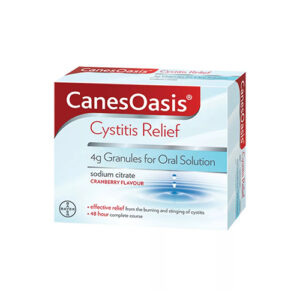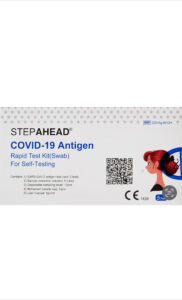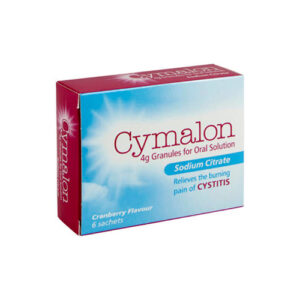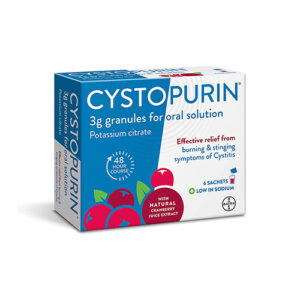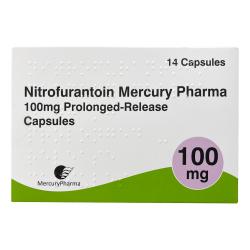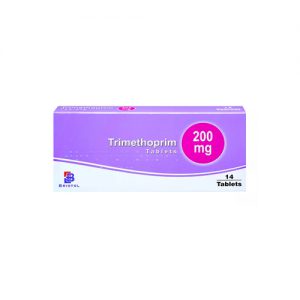Showing 6 products
Pagination
What is cystitis?
A common infection that affects the urinary bladder, Cystitis is part of the broader category of infections affecting the urinary tract and is often referred to as a urinary tract infection (UTI).
UTI’s will affect most women at least once during their lifetime. It is more common in females because they have shorter urethras compared to males. Furthermore, the uretha in females is located closer to the anus which means gut bacteria can migrate more easily into the female urinary bladder.
Some important points:
- Sufferers can have repeated bouts of infections
- Pregnant women are at higher risk
- Post menopausal women are at higher risk
- Sexually active women are at higher risk
Often cystitis is mild lasting a few days and the symptoms can resolve without antibiotic treatment. Persistent or troublesome symptoms will require antibiotics.
Cystitis in men
Is uncommon, it is recommended that you visit your own doctor in such cases as there could be an underlying illness such as prostate enlargement and diabetes amongst others.
Types of cystitis
Bacterial
The most common bacteria causing infection of the urinary bladder (cystitis) is e.coli. They mostly are transferred from the anus (gut bacteria). Contributing factors and causes include:
Hygiene: The short female urethra and close proximity to the anus predisposes to bacterial transfer to the urinary passage.
Underwear: Tight undergarments can spread bacteria to the urinary passage.
Diabetes: High sugar in the urine allows bacteria to thrive within the bladder and urinary passage. .
Residual urine in bladder: Some people who cannot fully empty their bladder are more prone to infections to stagnant urine within the bladder.
Severe dehydration, lack of fluid passing through the kidneys and urinary tract means the bladder is not emptied regularly, stagnant urine predisposes to infection.
Tampon users have been reported to have a higher rate of urinary infections.
Non-infectious causes:
- Medications- Certain medications cause irritation and inflammation of the urinary bladder whilst they are excreted, an example is cyclophosphamide.
- Chemical allergies- Certain chemical can cause irritation and inflammation of the urinary bladder, this may make it prone to superadded bacterial infection. Examples of such chemical are soaps, deodorants and bath oils.
- Autoimmune causes- Complex immune response. The body mistakenly attacks an individual’s own cells thinking they are ‘foreign’.
- Radiation- Patients who have received radiotherapy to the pelvis region are prone to radiation cystitis.
Symptoms of cystitis
There are usually a typical set of symptoms that help make the diagnosis of cystitis.
These include:
- Pain when urinating (burning or stinging sensation)
- Foul smelling urine
- Discoloured urine (frothy, cloudy urine)
- Blood in urine (rosier or pinky coloured urine)
- Need to frequently urinate
- Abdominal pain
- Fever
- Body aches
- Nausea
Benefits of treating cystitis
Not all cases of cystitis even if bacterial in nature require treatment. Most people have mild symptoms ad recover in a few days.
If the symptoms are persistent or troublesome it may be beneficial for you to start a course of antibiotics.
How can I treat cystitis?
Antibiotics
Trimethoprim is a highly effective antibiotic for the treatment of cystitis. Antibiotics are particularly useful in treating troublesome symptoms and to hasten recovery.
Hydration
Adequate or even slightly excess hydration (with water) will keep your kidneys functioning optimally. They will produce plenty of urine which can help to flush out any infection.
Preventing cystitis
A few practical points to help you deal with cystitis and reduce its recurrence:
- Drink plenty of water (at least 1.5litres per day)
- Cigarette smoking acts as an irritant to the bladder predisposing to infections, it has also been linked to bladder cancer.
- Washing/bathing- showers are better than batch and avoid lotions or bath oils that may be causing irritation.
- Clean loose undergarments will help to reduce infections.
Why do most online pharmacies limit how often you can have a course of antibiotics for cystitis?
There are two main reasons for this:
- Recurrent urinary tract infections are defined as 2 or more infections in 6 months. Whenever you experience recurrent cystitis, you should check with your physician to determine whether there is another cause, possibly due to menopause, sex, or even diabetes. If this is the case, your doctor may recommend sending your urine for urinalysis. This will enable them to determine what bacteria caused the infection and what antibiotics would be most effective to ensure you are receiving the proper treatment.
- Using antibiotics repeatedly can lead to antibiotic-resistance. Online pharmacies and prescribers generally recommend that it is advisable to alternate between trimethoprim and nitrofurantoin so as to reduce antibiotic resistance.
Where can I buy treatment for cystitis?
Access Doctor can offer antibacterial treatment for urinary tract infections.
Start your online consultation now and one of our doctors will instantly assess your suitability. We offer next day delivery so you can start your treatment as soon as possible.
How soon after I start antibiotic treatment will I feel better?
The symptoms should improve within one day, and sometimes even within a few hours of treatment. Following the burning sensation and urgency to pass urine, you may also have a few days of irritation and the feeling that you need to pass urine.
How can I treat the pain?
To ease discomfort, you can purchase painkillers from a chemist, such as paracetamol or ibuprofen.
What if I don't feel any better?
Most cases can be treated with either nitrofurantoin or trimethoprim right away, without sending a urine sample to determine what bacteria are present. If the treatment was intended to work, it would work quickly.
If you do not feel better after 48 hours of starting treatment, it is worth talking to your own doctor or GP about your situation. It is possible that the bacteria causing your infection are resistant to nitrofurantoin or trimethoprim. In order to determine whether there is a bacterial cause, a urine sample should be sent to a local lab for microscope examination and culture. Antibiotics will be prescribed if necessary.
This type of test is performed in cases where treatment has not been effective. Due to the fact that results can take 1-3 days from the time the sample is received, a different antibiotic may be prescribed by your doctor, such as pivmecillinam, cefalexin, or fosfomycin.
Why do I get vaginal thrush when I take antibiotics?
A yeast called candida albicans can cause thrush, which is generally harmless in the body.
Antibiotics not only kill the bacteria on which they are prescribed, but they also destroy 'healthy' bacteria as well. It is common for diarrhoea and abdominal cramps to result from bacteria in the gut becoming out of balance.
By reducing the number of bacteria in the vagina, yeasts which are not affected can then multiply and cause thrush.




We’re here to help.
Our friendly team is available to help Monday to Friday 9:00am - 5:00pm.
If you need urgent assistance, do not use this service. Call 111, or in an emergency call 999.

